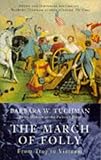Rating: 




 March of Folly: From Troy to Vietnam
March of Folly: From Troy to Vietnam
I read this book with great interest, not simply as a history book, but as describing an aspect of mankind familiar to all, the ability to act in a way contrary to any possible self-interest. If you define wisdom as `the exercise of judgement acting on experience, common sense and available information’, it is clear we often behave in the opposite fashion..
Barbara Tuchman identifies this trait, folly, with the characteristic rejection of reason, as all too common in government policy and elsewhere today. She quotes Plato, `when desire disagrees with the judgement of reason, there is a disease of the soul, and when the soul is opposed knowledge..that I call folly’.
The three historical examples she explores in detail are, the Renaissance popes provoking the Protestant secession, the American War of Independence, and the Vietnam War. Each of these accounts, is, in my view, the work of a mature, reflective historian, not simply recounting facts, or dry history, but discerning lessons and meaning for us, in the light of `those who cannot learn from the past are condemned to repeat it’ (George Santayana).